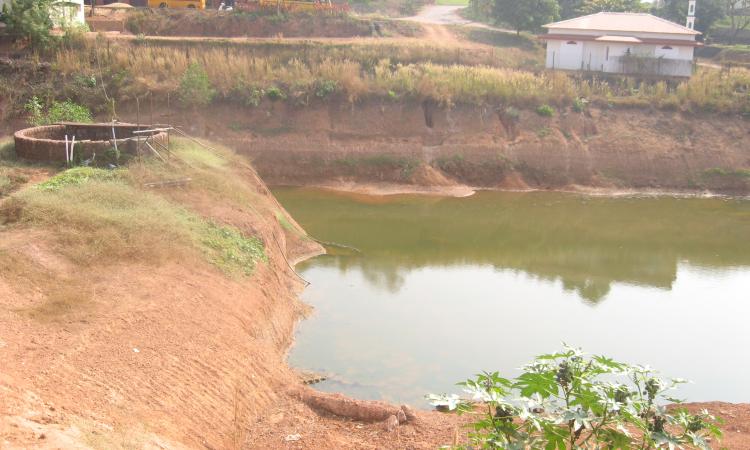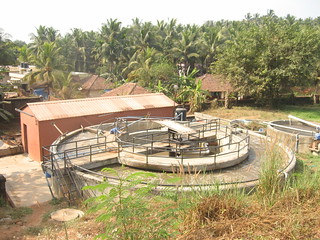
Yenepoya Medical and Dental College, some 15 kilometres away from Mangalore city near Delarekatte, is located in a developing neighbourhood; three other medical colleges, many schools and the Mangalore University are all situated in the same area. A software park is also expected to come up shortly. All this has caused a sudden increase in the area's population as well as in the demand for resources, specifically water.
The college that spans 33 acres is located on a hilltop. It had already started experiencing water scarcity and depended on water from tankers for almost eight months of the year. A few lakh Rupees were being spent annually to pay for the tankers. This was a few years ago.
That was when the decision to harvest rainwater was made. Narayana Bhatji, the manager of this water harvesting project says, "We started this project by consulting P. K. Thampi, a retired geologist from Trivandrum who helped us with the selection of the spot for digging the pond".
Rainwater harvesting efforts at the college
A 3-acre wide and 6-7 foot deep pond was dug at the lowest elevation to catch the draining water or runoff from the campus. An embankment or a bund was constructed at the lower elevation of the pond to restrict the flow of water.

A plastic Low-Density Polyethylene (LDPE) sheet was inserted in the middle of this bund to prevent seepage. The sides of the pond were covered by coir material to prevent the sand from getting inside the pond. An interesting thing about this effort is that the dugwell from which water is drawn out for daily use is located right in the middle of the pond. Besides the dugwell, there are two borewells on campus to meet the needs of both the medical and dental colleges. The open well is 25 feet deep while the two borewells are 40 feet deep.
Around 1 lakh litres of water is pumped from the well and 457,000 litres from both the borewells each day. Narayana Bhatji proudly says, "This makes us self sufficient for around 5 to 6 months. However, we still have to get around 4000 litres of water by four tankers on the campus".
Wastewater recycling efforts at the college

The campus also has three sewage treatment plants where water from the hostels and other quarters is treated and pumped back. This is used for irrigation and for flushing the toilets. The whole garden in the campus area is watered using this recycled water.
Rainwater harvesting at the hostel/residential complex
Another rainwater harvesting pond has been dug near the hostel and the residential complex of the medical college. This pond is around 6 - 7 feet deep and is surrounded by a fence. The roads surrounding the residential complex have been excavated and now slope in order to collect all the water that drains from the surrounding areas. This is collected by pipes that open into the pond.
 Yenepoya Medical College has demonstrated that with determination and the inclination to be self-sufficient, organisations with large campuses such as medical colleges, hostels, housing colonies, factories and schools can go a long way in solving their water scarcity problems by developing sustainable models by using rainwater harvesting. This will greatly reduce the monetary burden that most such institutions currently face due to over dependence on water tankers.
Yenepoya Medical College has demonstrated that with determination and the inclination to be self-sufficient, organisations with large campuses such as medical colleges, hostels, housing colonies, factories and schools can go a long way in solving their water scarcity problems by developing sustainable models by using rainwater harvesting. This will greatly reduce the monetary burden that most such institutions currently face due to over dependence on water tankers.
Acknowledgements
The author is grateful to Shri Padreji for introducing her to this effort made by the Yenepoya Medical College. She is also grateful to Narayana Bhatji for taking her around and showing her the efforts undertaken by the college.
For any further information on this effort, Narayana Bhatji can be contacted at this number: 09845167855